Bean Sprouts Treat Anemia, Prevent Oxidation of Cholesterol And Heart Disease
Last updated on
When talking about bean sprouts, most people think of mung (or moong) bean sprouts, which are the most commonly used bean sprouts. But a variety of many other beans and seeds can be sprouted, including alfalfa seeds, sunflower seeds, kidney beans, white beans, peas, lentils and adzuki beans.
In general terms, bean sprouts are the tender, edible shoots of certain bean plants. They are the result of the germination process, through which the nutritive ingredients found in beans and seeds become profoundly modified.
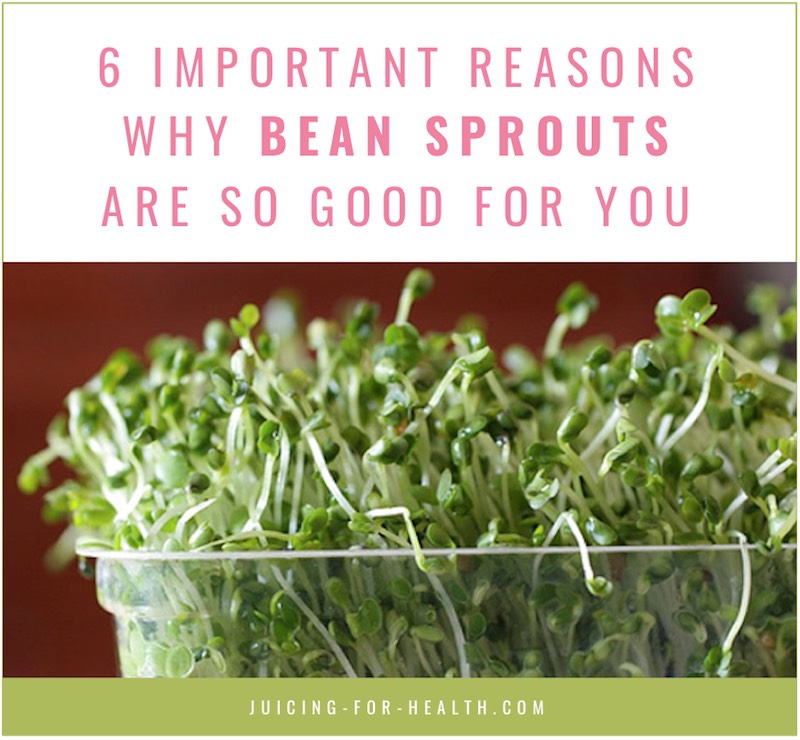
Why Sprouted Seeds Are More Nutritious
Studies show that germination of mung beans dramatically increased the vitamin C content, and reached the peak on day 8 of germination, up to 285 mg/100 gram, almost 24 times higher than the initial concentration in mung bean seeds.
One serving of raw mung bean sprouts of about 100 gram provides 21.6 mg of vitamin C, which could meet 36% of daily value (DV).
In addition, the germination dramatically increased total phenolic compounds by up to 4.5 times, and total flavonoids by 6.8 times higher than the orgiinal concentration of mung bean seeds.
The total antioxidant activity of mung bean sprouts was increased by 6 times higher than that of their seeds.
Why Are Bean Sprouts Good For You?
Sprouts are predigested food, which means that your body has an easier time absorbing the nutrients. Along with that, there are 6 important reasons why sprouts are so good for you:
1. Sprouts have higher antioxidants content
A huge benefit of eating more sprouts is the amount of amino acids and antioxidants that you will receive. The combination of additional amino acids and antioxidants go a long way towards fighting cancer and improving your brain function.
2. Sprouts have a high fiber content
Sprouts have a high fiber content that is beneficial for a healthy digestive tract. Fiber binds to fat and toxins inside your body and helps them pass through your system, allowing your body to quickly break down the fat. This improves your chances of losing weight and keeping the weight off.
3. Sprouts have an abundance of enzymes
Compared to uncooked fruits and vegetables, sprouts can contain up to 100 times more enzymes. Enzymes are necessary for all body functions and also help with foods digestion. Receiving more enzymes can improve your body’s ability to absorb nutrients and work more efficiently.
4. Sprouts are rich in high quality protein
Foods that are already a good source of protein, such as beans, nuts, seeds, and grains, offer higher quality protein when they are consumed as sprouts. During the soaking and sprouting process, proteins change and their nutritional value peak between days 3 and 8 .
5. Sprouts contain more vitamins
Along with providing more protein and fiber than their raw counterparts, sprouts contain more vitamins. You can expect up to twenty times as many vitamins with some seeds, beans, grains, and nuts, including more vitamins A, C, and E, and the B vitamins.
6. Sprouts are a great source of essential fatty acids
With the sprouting process, sprouts also end up becoming a great source of essential fatty acids. Most people do not consume enough omega-3 fatty acids, which are also found in eggs, fish and most seafood.
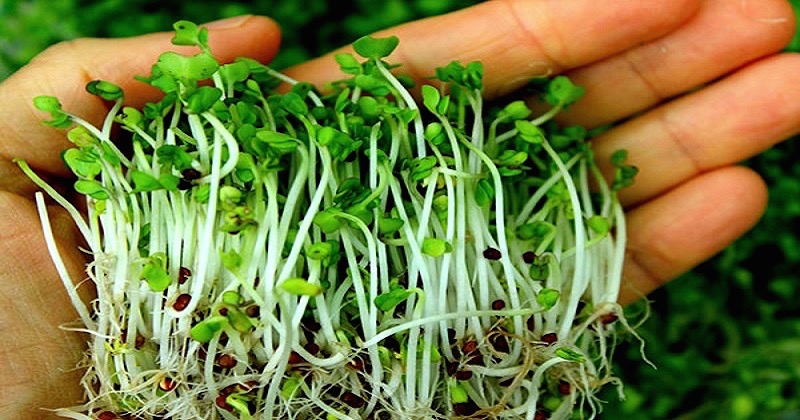
Bean Sprouts Nutritional Value
Bean sprouts have been used for centuries for their nutritional and medical benefits. They can be eaten raw or lightly cooked or they can be juiced. Flavor varies from sweet delicate to sharp intense, depending on the type of sprout.
Bean sprouts are a true concentrate of energy and nutritive principles. Unlike ripe vegetables, which nutritional value progressively decreases after they have been harvested, bean sprouts retain their nutritional properties until consumed.
Bean sprouts have the richest source of amino acids (for protein), vitamins and minerals, and also contain a good amount of fiber. They contain all types of vitamins (A, B, C, D, E and K), folate, and are an excellent source of iron, potassium, calcium, phosphorous, magnesium and zinc.
Other nutritional benefits vary depending on the type of sprout. It is interesting to note that mung bean sprouts contain estrogen-like phytochemicals, called isoflavones, which are responsible for some of the many healthy proprieties of these sprouts.
What Are The Healthiest Sprouts To Eat?
When it comes to sprouts, not many types of bean sprouts are easily available. If you can get hold of any of the following, they are the healthiest sprouts to eat. Or grow your own.
-
Alfalfa sprouts
One of the most popular sprouts around the world, alfalfa sprouts are often enjoyed in sandwiches due to its neutral flavor, richness in nutrients and crunchy texture.
-
Beet sprouts
Beet sprouts have colorful stems in dark red and bright green leaves. Like beetroots, the sprouts have a slightly earthy taste and are sweet.
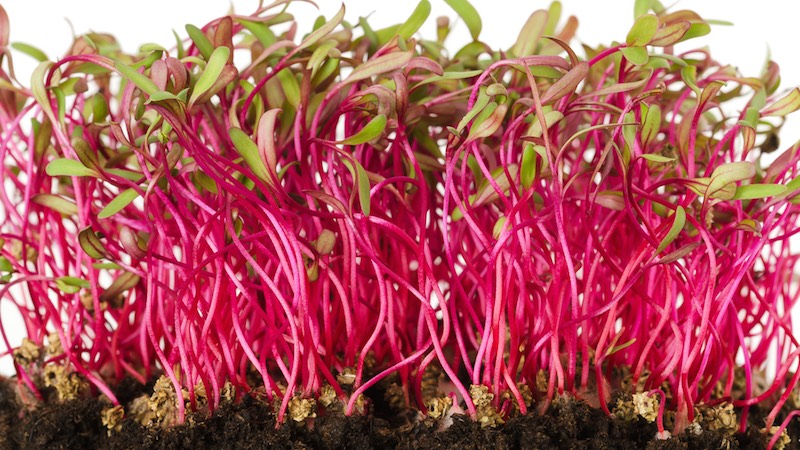
-
Broccoli sprouts
Broccoli sprouts became popular when reseaarchers isolated a cancer-fighting compound called glucoraphanin that makes sulforaphane glucosinolate.
-
Fenugreek sprouts
Fenugreek sprouts have a bitter taste and best to be added in salads. They are particularly beneficial for female breast health. They contain substantially more organic phytoestrogens than any other sprouts.
-
Pea sprouts
Often known as pea shoots, these are mild-tasting, often used in Asian cuisine. They have a delicious, nutty and distinct pea-like flavor, and highly concentrated with nutrients and enzymes.
-
Lentil sprouts
Like lentils, the sprouts have a nice, crunchy texture with a rich nutty-flavor. And like all sprouts, they contain the highest amount of nutrients and enzymes when sprouted.
-
Wheatgrass sprouts
Wheatgrass sprouts are more common compared to the other sprouts discussed here. They are best harvested at about the 7th day. Wheatgrass are often not eaten but juiced. The juice is rich in a wide range of nutrients that make it a beneficial drink to be included in cancer diets. Learn how to grown wheatgrass at home.
Health Benefits Of Bean Sprouts
Sprouts from all beans and/or seeds are so high in digestible nutrients, vitamins and minerals that they can be considered true multi-ingredient natural supplements.
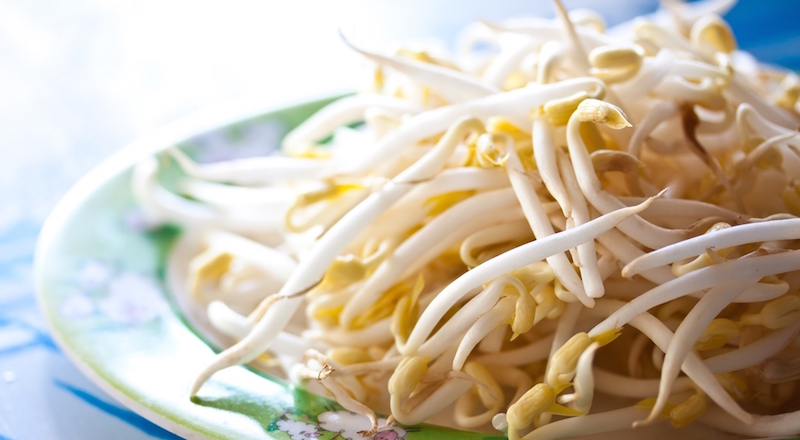
However, here we will focus on the health benefits of mung bean sprouts, which are the most commonly consumed sprouts all over the world and the most studied by researchers.
Although these health benefits most likely apply to most bean sprouts as discussed above.
-
Treat anemia
Mung bean sprouts (as well as other types of bean sprouts) are rich in iron, which plays a key role in the synthesis of hemoglobin, the protein found in red blood cells. They are also particularly high in vitamin C, which enhances the absorption of iron in the intestines, thereby effectively helping to prevent or treat anemia caused by iron deficiency.
-
Lower blood glucose
A study showed antidiabetic effects of mung bean sprout extracts, when fed to diabetic lab mice for five weeks. It was found that mung bean sprouts lowered blood glucose, plasma C-peptide, glucagon, total cholesterol and triglyceride levels. Also markedly improved, were glucose tolerance and increased insulin immunoreactive levels.
-
Strengthen cardiovascular health
When associated with a low intake of saturated fats (found in meat, poultry and dairy products), the regular consumption of bean sprouts can help reduce the blood levels of LDL-cholesterol due to its content in fiber and lecithin. This effect is beneficial to the heart and vessels, since it helps prevent the development of atherosclerosis, the most common cause of cardiovascular disease.
-
Relieve and prevent constipation
Due to their high content in fiber, bean sprouts can help improve intestinal motility and relieve the signs of constipation.
-
Improve eye health
The high antioxidant content in bean sprouts is beneficial for improving eye health and preventing eye disorders, such as age-related macular degeneration.
-
Strengthen hair and nail
Hair and nail fragility is often the result of certain nutritional deficiencies, especially proteins, vitamins and zinc. Bean sprouts contain high amounts of all these nutrients in a readily available form, and hence they are particularly helpful in preventing and treating hair and nail problems. (See below for a bean sprouts juice recipe that strengthens hair health.)
-
Improves cognitive ability
By improving your cognitive ability, you can delay the onset of Alzheimer’s disease or slow the progression of the disease. The high content of antioxidants in bean sprouts help neutralize the damages done by free radicals, which not only affect brain functions, but are also known to cause various types of cancer.
-
Support liver health
Bean sprouts are an excellent source of lecithin which, besides lowering blood cholesterol levels, helps reduce liver fat, thereby preventing fatty liver, a common liver condition that can result in liver dysfunction.
-
Reduce symptoms of menopause
Mung bean sprouts are rich in phytoestrogens, which have a weak estrogen-like activity. That’s why they can help relieve many symptoms associated with menopause (such as hot flashes and heart palpitations), which are the result of decreased estrogen levels. Phytoestrogens found in mung bean sprouts are also effective in counteracting menopause-related osteoporosis.
-
Benefit skin health
It has been shown that phytoestrogens found in mung bean sprouts act on certain estrogen-receptors found in the skin, stimulating the synthesis of hyaluronic acid, collagen and elastin, which are vital components of the skin’s structure. Therefore, the regular consumption of mung bean sprouts can help prevent many age-related skin changes, including elasticity and moisture loss.
-
Boost your energy levels and metabolism
Your body is able to absorb more of the nutrient content of sprouts, thus increasing the efficiency of your digestive process, which in turn helps burn calories and convert carbohydrates into energy more efficiently.
How To Consume Bean Sprouts
Most sprouts can be eaten raw; if cooking them, sauté very lightly or just a quick blanch or light steam. Do not overcook. Whether raw or cooked, bean sprouts can be used in a variety of dishes, including appetizers, salads, side dishes and snacks.
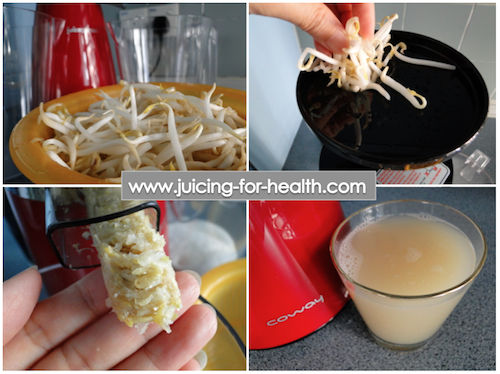
They can be juiced as well, but usually added to other vegetable juices. To get used to their flavor, it is recommended to start with a handful of sprouts added to other green juices and then increase the amount depending on your taste.
Bean Sprouts Juice to Prevent Hair Loss
Bean sprouts juice contains these vitamins that are essential for hair health. They strengthen hair and prevent them from breaking and falling: Vitamin A, B vitamins (especially biotin), selenium, zinc and silica.
Make this juice and drink regularly. You may also soak your hair with this juice and leave it for about 20-30 minutes, 2-3 times a week for absorption into your scalp for a healthy scalp.
Bean Sprouts Juice Recipe To Prevent/Reduce Hair Loss:
- 30 grams of bean sprouts
- 2 green apples
- A squeeze of lemon juice
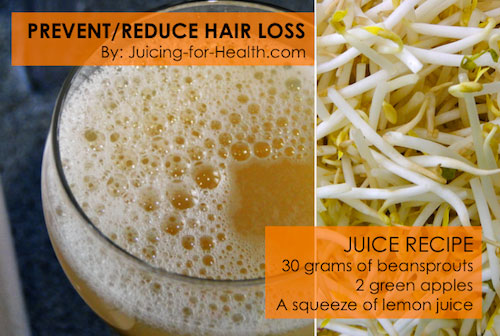
How To Grow Your Own Bean Sprouts
You do not need any special equipment nor experience to grow your own sprouts.
When you grow your own sprouts, you are also doing your small part to reduce the production of crops, helping the environment.
You will not have to worry about any of the harmful chemicals and toxins found in many commercially grown produce. Sprouting takes only a few days and does not require a lot of work.
Go here to learn how to grow your own bean sprouts.
Cautionary Note
Always ensure that sprouts are kept at refrigerator temperature. Throw away sprouts that smell, have turned dark or are slimy. Rinse sprouts thoroughly with water before consumption.
Some people are allergic to the proteins found in certain legumes or legume sprouts, and hence they are recommended not to consume them at all.
Some of the links I post on this site are affiliate links. If you go through them to make a purchase, I will earn a small commission (at no additional cost to you). However, note that I’m recommending these products because of their quality and that I have good experience using them, not because of the commission to be made.
Comments
Leave a Reply

































 JOIN OVER
JOIN OVER
Sara, thank you for the sprout info. I was hoping that bean sprouts could help me with my low platelets of around 4 every week, as I receive 2 bags of platelets. I have also received blood transfusion but not since Sept. 16th. I am therefore showing Transferrin level as high as 3690 to last week. Are there any other sprouts to help my with my idiopatic aplastic anemia. Any input or answer I will appreciate. Thank you
Hi Sieglinde, please consider papaya leaf juice/extract for increasing blood platelets:
http://juicing-for-health.com/papaya-leaf-juice-increases-blood-platelet-count